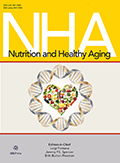Authors: Bigman, Galya | Shea, Kyla M. | Rusu, Marius Emil | Ryan, Alice S.
Article Type:
Research Article
Abstract:
BACKGROUND: The prevalence and relationship between dark green vegetables (DGV) and specific cognitive domains in the aging US population are not well-established for men and women. OBJECTIVE: To explore the associations between DGV, its bioactive nutrients, and cognitive function, including its specific domains, and whether they differ by sex METHODS: The study analyzed a cross-sectional sample of 2,793 US adults aged 60 or older from the 2011–2014 NHANES. DGV was dichotomized, and bioactive nutrients were divided into quartiles. Weighted linear regressions were used to analyze the association between DGV, bioactive nutrients, and standardized cognitive function scores,
…including specific domains (CERAD, DWR, AFT, DSST), while controlling for covariates. The study also tested for sex-based effect modification RESULTS: Overall, 61.7% of participants reported no DGV intake, and men reported no DGV intake more frequently than women (67.8 vs.56.5%, p < 0.001). DGV was associated with overall cognitive function(β= 0.10, p = 0.024) and by its specific domains: memory-related i.e., learning and remembering (CERAD:β= 0.10, p = 0.015; DWR:β= 0.10, p = 0.010), marginally associated with executive function (AFT:β= 0.10, p = 0.075), but not with problem-solving(DSST:β= 0.03, p = 0.587). Although the associations between bioactive nutrients and specific cognitive domains were mixed, a higher intake of these nutrients was still linked to higher overall cognitive function. Only β-carotene and its associations with overall cognitive and AFT were modified by sex. CONCLUSION: The majority of US older adults (>60%) lack DGV in their diet. Intake of DGV, which is rich in phylloquinone, β-carotene, and α-tocopherol, may benefit certain domains of cognition in men and women, such as learning and memory
Show more
DOI: 10.3233/NHA-220193
Citation: Nutrition and Healthy Aging,
vol. 8, no. 1, pp. 67-77, 2023





